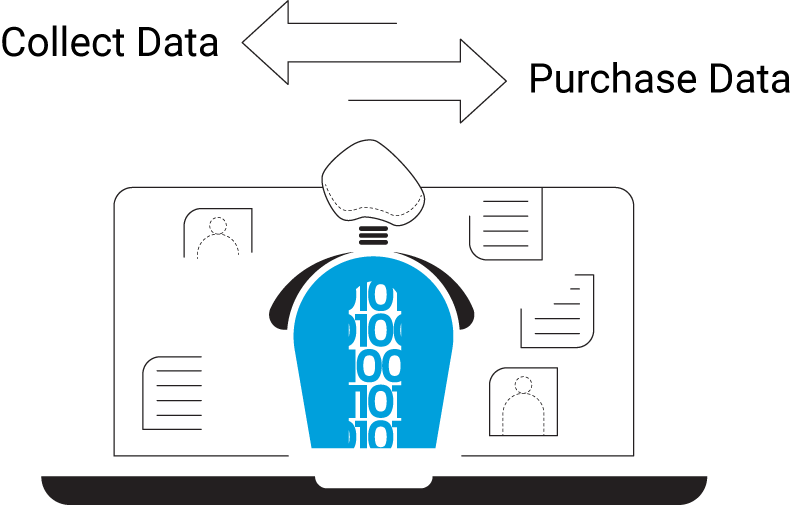Businesses like yours collect and use data for a variety of reasons, though you may not realize it. But the truth is that all businesses need reliable data in order to run effectively. That is because good data is key to understanding individuals or companies that ultimately purchase your products or services. And when you understand your customers, you can curate a better user experience, design more products and services they need, and so much more.
Below we’re going to answer the question, what is data? Then we’re going to talk about the ways in which your company can take advantage of collected data. Next, collecting versus purchasing data—and which route will be best for your business. And finally, we’ll talk about different ways you can use data to grow your business.
Let’s get started.
What is data?
According to the dictionary, data is individual facts, statistics, or items of information. This information can be either qualitative—divided into categories like gender, marital status, type of business, or job title—or quantitative, referring to a numerical value, including things like age, number of pets within a household, or number of purchases from a specific seller.
Businesses often collect both types of information about leads and customers and this can be done either digitally or through a 1:1 interaction. When data is collected digitally, it’s often done through a form. Think about the last time you signed up to receive information about a specific product or service. You likely had to fill out your name and contact information. Maybe you needed to clarify what company you worked for or what your specific role in your company is. Data may also be collected digitally through a survey or a check out page.
When data is collected 1:1, it can be through things like a phone call, in-store observation, or a purchase. From the name on your credit card to how much you spend to how often you buy; this is all data that a company may collect on its customers.
Benefits of collecting data
You may have already begun to imagine all the ways your company can benefit from data. Every business, no matter how large or small, should have a system in place to track the data that they collect. And by “system” we do not mean a spreadsheet!
Customer Relationship Management (CRM) software is a system built to manage customer relationships. How does it do this? By helping you make sense of the data you collect on your leads or customers. A good CRM allows you to create individual profiles for each unique lead or customer. In doing so, you can store qualitative and quantitative data about him or her that can be accessed by anyone in your company. From there, you can sort people into a variety of categories based on your best customers. Some examples are:
Cold lead
Warm lead
Hot lead
Females at or over 50 years of age with at least one purchase in the last year.
CEO of companies with 0-50 employees who have been in business for over a year.
You can also collect more personal details about leads and customers to add to your CRM. Done through a series of interactions that form a connection, personal details may include things like children’s names, favorite vacation spot, or their spouse’s birthday.
Using a CRM to collect and sort your data ensures your leads and customers have a personalized, streamlined experience no matter who within your company they speak with.
Ways to procure data
Now that you know what data is and how your company can benefit from it, let’s explore how you can obtain it. There are two paths to adding data to your CRM—collect it or purchase it.

Data Collection
Through a variety of sales and marketing efforts, customers may share their data with your company in exchange for something. This is all part of a company’s marketing funnel, which is designed to turn a lead into a valuable, loyal customer. Some ways in which customers might share their data include signing up for a newsletter, taking a quiz, or asking for more information through a contact form.
Data Purchase
This is the act of buying prospect information through a big data company. It offers a way for organizations to quickly capture qualitative or quantitative data in bulk. Information collected by big data companies is found through publicly available sources like phone books, press releases, websites, voter registration files, tax assessments, and bill processors.
Uses for data beyond sales and marketing
Whether you collect data, purchase data, or some combination of the two, there are many ways you can use the data your company has on file. Most businesses think in terms of marketing and sales. For example, a company uses the email or mailing address they have on file to send out information about upcoming promotions or sales. But there are a variety of uses for data that go beyond sales and marketing.

Data Enrichment
Enrich contact and lead data with more complete information. For instance, you may have collected someone’s full name and email address. Through enrichment you may be able to add their mailing address and phone number.

Audience Segmentation
Understand the characteristics of your best customers to build personas and/or segment your audience. This allows you to bring a more targeted approach to your sales and marketing tactics.

Risk Analysis
Businesses like lenders can use data to evaluate risks associated with doing business with a particular customer, supplier, or partner. That’s because data can offer insights into things like credit worthiness, payment history, owner net worth, bankruptcy filings, leans, judgements, years in business, size of business, and so much more.

Location Planning
For organizations who want to open a new location, data can help make the decision easier. Understanding details like the demographics of surrounding households, daytime population, competitive landscape, historical tenants, and available public services are all considerations a company may want to weigh before making a final decision.

Identity Verification
View both current and historical details about a business. Find information like prior business name, prior addresses, affiliated companies, mergers or acquisitions, duplicate records, building owners, and even tenants. This data service is similar to risk analysis in that it can help you better understand someone you may do business with.
As you can see, the uses for data go well beyond basic sales and marketing. More importantly, both collected and purchased data have a unique place in today’s competitive landscape!





